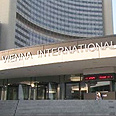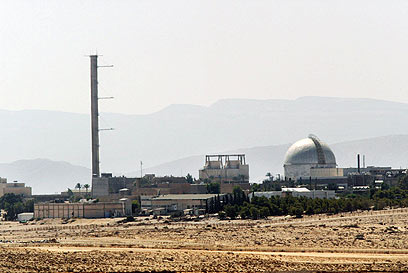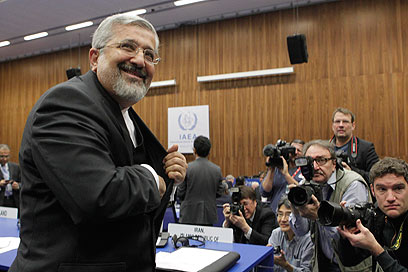
Syria slams Israel on nuke program
While Damascus blasts Jewish State's undeclared atomic arsenal, saying it poses 'grave threat' to region, other Arab nations participating in IAEA gathering avoid voicing criticism
Syria accused Israel of posing a "grave and serious threat" through its undeclared atomic arsenal Monday, at a meeting between the Jewish state and its Arab neighbors meant to narrow differences on creating a Mideast nuclear weapon-free zone, officials said.
Aside from Iran, which is boycotting the two-day meeting, Syria is Israel's bitterest Mideast rival, and Syrian delegate Bassam al-Sabbagh voiced rhetoric similar to standard Arab criticism of Israel.
Related stories:
- Iran: IAEA report risks our scientists' lives IAEA board rebukes defiant Iran over nuclear program 'Iran ready to cooperate further with IAEA'
But officials reporting on the closed International Atomic Energy Agency gathering said that except for Syria and Lebanon, its lockstep ally, other Arab nations speaking at the meeting were lower-key than usual in chastising the Jewish state for refusing to open its nuclear program to UN perusal.
Israel, for its part, restated its view: no discussions on a nuclear-free zone without peace in the Middle East.
"Experience shows that such a process can only be launched when normal, peaceful relations exist in the region, when the threat perception of all regional members is low, and only after basic confidence is established among states of the region," noted David Danieli, Israel's deputy nuclear chief.

Israel's reactor in Dimona (Photo: AFP)
For now, he said, "Political instability, open hostilities, deep mistrust and noncompliance with international obligations are too common in many parts of the Middle East region."
Despite the sharp Syrian remarks, one of the officials who attended the meeting said the atmosphere was "much less confrontational, much less hostile" than at other IAEA gatherings focused on the Middle East that traditionally see Muslim nations speaking with one strongly critical voice about Israel's nuclear capabilities. The official spoke on condition of anonymity because the meeting was held in private.
'Fresh thinking'
Most Mideast participants at the 97-nation meeting appeared to be heeding an appeal by IAEA chief Yukiya Amano. In opening remarks, Amano urged Mideast nations to focus on "fresh thinking," adding he hoped they would be able to move "beyond simply restating long-established positions."
Officials and participants warned against high expectations at the gathering, which is hearing presentations on already established nuclear-free zones elsewhere as a way of stimulating discussion on the Middle East and is not meant to reach any decisions.
A decision last year by the 189 members of the Nuclear Nonproliferation treaty to convene a UN-sponsored conference on establishing a Middle East nuclear-free zone in 2012 was an incentive for most of the region's Muslim nations to meet this year with Israel for the exploratory Vienna talks.

Arab countries and Iran are aware of the potential of using the 2012 UN conference as a platform to pressure Israel to fulfill their long-standing demands: joining the nonproliferation treaty, acknowledging that it has nuclear weapons and allowing IAEA inspectors to probe its atomic activities.
Israel is unlikely to do any of that. It remains unclear whether it will even attend the 2012 talks and is at the Vienna meeting only under the stipulation that it remain a nonbinding give-and-take on the issue of nuclear-free zones in general.
The official who attended the meeting said that early discussions Monday touched on a main point of division between Israel and the Arabs – whether the Jewish state needs to join the Nonproliferation Treaty as a prerequisite to creation of such a zone. That is demanded by the region's Muslim countries but is rejected by Israel.
The official said that presenters for Argentina and South Africa, talking about their own regional zones, suggested that – based on the experience of their regions – NPT membership is not needed to begin talks.
Israel is commonly considered to be the only Middle East nation with atomic weapons – and its secretive nuclear program has long been a heated subject of contention with Arab neighbors.
The Arabs have urged Israel to open up to international inspection. Israel in turn says that Iran is the greatest threat to the region through its refusal to heed UN Security Council resolutions demanding it stop activities that could be used to make nuclear weapons and suspected research and development of such capabilities.
- Receive Ynetnews updates directly to your desktop










